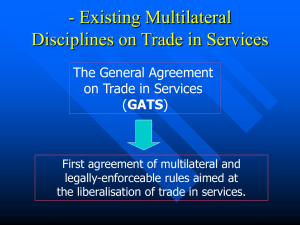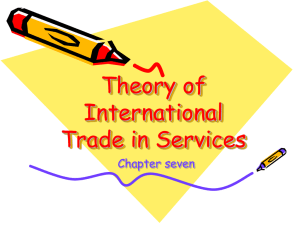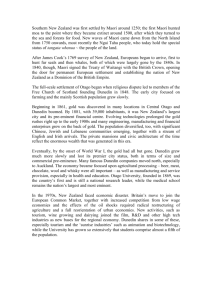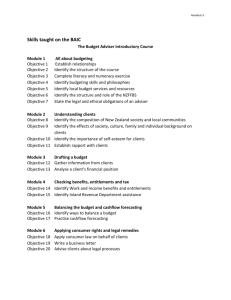M - New Zealand Council of Trade Unions
advertisement
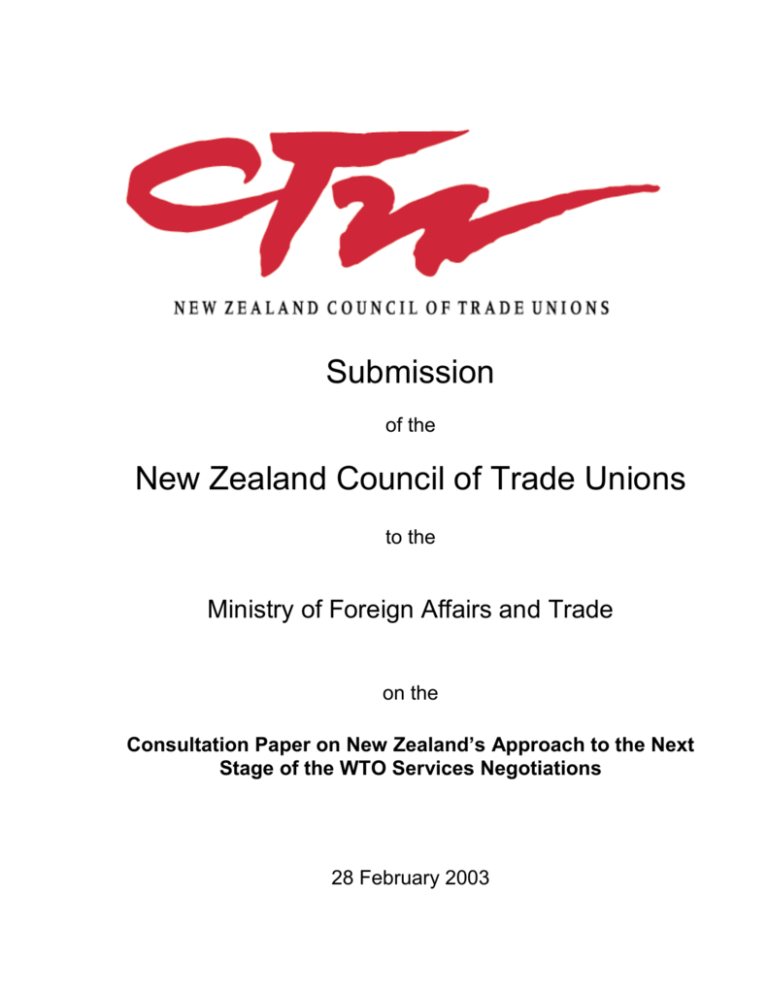
Submission of the New Zealand Council of Trade Unions to the Ministry of Foreign Affairs and Trade on the Consultation Paper on New Zealand’s Approach to the Next Stage of the WTO Services Negotiations 28 February 2003 NZCTU Submission on WTO Services Negotiations February 2003 The NZCTU submits: That full public consultation with adequate timelines and clear explanatory material take place around any proposed expansion of New Zealand’s existing commitments under GATS. This means that 31st March is far too early for an initial offer. That New Zealand insist that a thorough review be conducted of the impact of GATS on development, democracy, environmental sustainability, health and human rights in member states. That New Zealand work to ensure that no further negotiations take place until such a review has been conducted and the GATS Agreement amended in recognition of its findings. That there are already very extensive commitments already made by New Zealand, and no case has been established for any further commitments to be offered. We seek the withdrawal of current education and cultural services commitments. That New Zealand work in this round to secure a clear exclusion of all public services, cultural services and infrastructure services from the ambit of the GATS agreement, and specify in relation to New Zealand commitments that the exercise of governmental authority’ allows, without threat of legal challenge, the exclusion of competition from public services and services of general interest. We welcome a more considered position from this Government in relation to the GATS negotiations, and note the ten guiding principles. However, we have raised some significant concerns about the application of those principles. 1 NZCTU Submission on WTO Services Negotiations February 2003 1. Introduction 1.1 The New Zealand Council of Trade Unions (CTU) is the internationally recognised central trade union centre in New Zealand. It represents 34 affiliated unions with a membership of approximately 300,000. 1.2 The CTU supports rules-based trade. However, we are often critical of the actual rules, we think the negotiation of rules is lopsided and advantages already powerful economies, we think important issues are left out of the rules (e.g. labour standards) and the enforcement of the rules is suspect at times. 1.3 In fact there is a groundswell of concern internationally about the effect of WTO agreements, including the GATS.1 The CTU is requesting that the NZ Government takes a lead and joins the growing international movement towards a reformed system for rules-based trade. 1.4 Our key concern in a domestic context is that there has not been a rigorous national interest test applied to the stance adopted in trade negotiations. 1.5 In relation to the services negotiations our key concerns are: (a) The timeframe for consultation is too short and the NZ Government should not therefore forward an initial offer by 31st March 2003 (b) Current regulatory and policy settings incorporate many elements of the extensive privatisation and deregulation of the 1980s and 1990s and are not therefore a basis for bound commitments in an international trade agreement. 1 See for instance the Brixen/Bressanone Declaration on Cultural Diversity and GATS, unanimously adopted by the European Regional Ministers for Culture and Education, 18 October 2002; the deliberations of the International Network on Cultural Policy with Ministers from 48 countries; and 2 NZCTU Submission on WTO Services Negotiations February 2003 (c) There is a significant list of requests made of New Zealand (including request in areas that the principles aim to rule out), and extensive requests made by New Zealand, but no indication of what services the government might be considering for inclusion in an offer and any evaluation of their domestic implications. (d) There is a lack of detail in the consultation document on requests. (e) There has been no assessment at the WTO of the current GATS agreement and commitments, as required in the text, and no such assessment by the New Zealand government prior to the commencement of these negotiations. (f) There is a vitally important need to protect public services, defined as services of a public good and socially beneficial nature, irrespective of who provides them. (g) Any New Zealand government response to GATS must fully acknowledge the status of Te Tiriti o Waitangi and the fundamental right of Maori to the protection of their commercial as well as non-commercial interests. (h) There needs to be an assurance of the right of this and future New Zealand governments to regulate and provide incentives in the context of sustainable development, and to pursue other policies which have a public mandate. 1.6 The CTU does however recognise that this Government is taking a more considered approach to these GATS negotiations than was evident in the last round. Commonwealth Code of Practice for International Recruitment of Health Workers to be signed soon by Ministers of Health of Commonwealth Countries. 3 NZCTU Submission on WTO Services Negotiations February 2003 1.7 The CTU is also seeking future discussions regarding the parallel negotiations in GATS Working Party on Rules on domestic regulation, subsidies, and procurement. 2. Timeframe 2.1 The CTU submits that the timeframe for consultation needs to be pushed out until mid-year due to the extensive requests made of New Zealand, the complexity of the issues inherent in services negotiations, and the certainty that other countries will not meet the 31st March 2003 deadline for initial offers. The CTU recognises that New Zealand wants to be seen as a “good WTO citizen” in terms of meeting deadlines, but we submit that the domestic constituency should not be relegated to second place. This requires more time before an initial offer is made. 2.2 We note also the comments of the Minister of Trade Negotiations, Hon Jim Sutton in response to a Parliamentary Question this week that: The Government will do its best to adhere to the 31 March deadline, because we have undertaken with our negotiating partners to do so. However, the exact timing of our tabling of our initial offer will, basically, be set by our own convenience. 3. Transparency 3.1 The CTU notes that there is no on-the-record indication of what the government is considering for inclusion in the initial offer or of the domestic implications of that. 3.2 We therefore seek a further round of public consultation on those matters, followed by full public disclosure at the time the New Zealand initial offer is made. 4 NZCTU Submission on WTO Services Negotiations February 2003 3.3 We also request that during the subsequent negotiation process there needs to be full disclosure and consultation in relation to subsequent requests and offers. 3.4 The process of negotiating GATS also directly contradicts the government’s obligations under Te Tiriti o Waitangi and denies tangata whenua an active and effective role. 3.5 The CTU supports debate and ratification by Parliament of trade agreements, including any new agreement on GATS. 4. Guiding Principles 4.1 The CTU welcomes the statement of guiding principles. We believe that this is an important recognition of the need for guiding principles for the services and other negotiations. Nevertheless, the CTU has a number of concerns about the specific principles. 4.2 One of the key concerns is around the fourth principle which gives an assurance that the Government does not intend making any initial offer that will necessitate a change in policy settings. The CTU could not support commitments on services that lock in current policy settings, many of which were established in the 1984-99 period. In the post-1999 period there has already been a number of changes in policies – such as the implementation of an economic development programme. There have also been changes in education, health and other social services, in the regulatory settings for energy and telecommunications, and in public provision of air transport, railways and banking. Therefore current policy and regulatory settings should not be set in concrete through the GATS negotiations. We are all aware of the problem created by previous services commitments in relation to compulsory local content in broadcasting. We do not want to see domestic regulatory 5 NZCTU Submission on WTO Services Negotiations February 2003 options foreclosed by additional GATS commitments when it is acknowledged by all that huge commitments were made in the last GATS round. 4.3 The CTU notes the very extensive commitments already made by New Zealand, and believes that no case has been established for any further commitments to be offered. Rather we seek the removal of existing commitments, in particular in relation to education and cultural services. 4.4 We note also that the guiding principles apply to the initial offer and we seek an assurance that the guiding principles with the clarifications requested apply to the entire negotiations. 4.5 The first principle states that any final commitments will be “guided by the overriding objective of securing tangible overall benefit”. The CTU submits that such a benefit needs to be clearly demonstrated. There is already considerable concern within the services sector that their interests are overwhelmed by the importance of agricultural access. A rigorous net benefit test should incorporate all domestic effects and not just focus on potential export gains in services or other areas such as agriculture, and should be opened for public debate. 4.6 The fifth principle continues the reservation regarding the treatment of Maori persons or organisations. However this applies only to commercial or industrial activities only and does not cover the full spectrum of rights under Te Tiriti o Waitangi. This threatens Maori economic, social, and cultural development particularly within the Maori communities not involved in commercial or industrial undertakings. The agreement restricts Maori development of the past, present, and future manifestations of their culture in terms of the protection of taonga, the promotion and development of the language and culture through research and education. GATS rules restrict favourable treatment to tangata whenua through the Most Favourable Nation principle and thus overriding Te Tiriti o Waitangi. 6 NZCTU Submission on WTO Services Negotiations February 2003 4.7 The CTU has strong reservations about any initiatives or agreements that could place Te Tiriti o Waitangi at risk. The Government need to be clear about what Te Tiriti o Waitangi means for Maori. It means self determination for Maori in specifically Maori matters, recognition and support for Maori leadership and structures, on issues, plans, visions which affect both Maori and Tauiwi. Where Maori express particular needs or concerns, decisions need to be genuinely negotiated on equal terms and include return of Crowncontrolled resources unjustly alienated from Maori owners, negotiated compensation to Maori for such resources which are no longer in Crown control, compensation for past and present dependency, poverty and discrimination as a result of policies and programmes that have locked Maori into this state of existence, recognition of Maori as Tangata Whenua, not as one ethnic minority among others, and of te reo me ona tikanga, the language, traditions and beliefs as having a major place in the institutions and fabric of Aotearoa. 4.8 Therefore any NZ government response to GATS has to fully acknowledge the status of Te Tiriti o Waitangi and the fundamental right of Maori to protect their interests in terms of the Treaty. This would include all the elements referred to in article 2 but does not exclude the other articles. 4.9 Maori have major concerns about how wahi tapu and other taonga will be preserved and protected. Also there is the issue of intellectual property rights, not only of an individual, but also of a whanau, hapu or iwi, let alone land and any claims associated with that. We are aware, for instance, that there are certain plants that have been traditionally used for rongoa, that have been patented by overseas pharmaceutical companies, so 'legally' Maori are not able to gather them. 4.10 Therefore the CTU does not believe the fifth guiding principle provides adequate protection of rights and obligations under Te Tiriti o Waitangi. 7 NZCTU Submission on WTO Services Negotiations February 2003 4.11 The CTU is pleased to note the strong statement in the sixth guiding principle that no initial offer would be made that would limit the government’s right to provide, fund, or regulate public services such as health and education (there are already commitments on education, and there were aspects of health services included in the Singapore-NZ CEP). However we believe that the entire schedule of NZ commitments should be subject to an explicit reservation stating that nothing in the commitments could be construed as to restricting in any way the Government’s rights in relation to provision, funding and regulation of such public services. Public services should be defined broadly as services of a public good and socially beneficial nature, irrespective of who provides them. 4.12 In respect of the ninth principle on immigration we make the point that the NZ immigration regime is itself subject to change. If immigration policy is being reviewed at the same time as issues such as intra-corporate transfer of specialist personnel is being considered in relation to services negotiations, there is at least a strong perception of a direct connection. It is also essential that there is an explicit and consultative assessment of the implications of this for the employment of New Zealanders and the long-term sustainability of a skilled New Zealand workforce. For unions, key issues in respect to immigration include a balance between immigration and extensive investment in education and skills of those already in New Zealand, the need for a strong settlement policy including matters such as employment conditions, collective agreement coverage, no use of migrants to undermine existing work conditions, access to advice for migrants, and fair treatment. 5. ICFTU Statement on GATS 5.1 The CTU is an affiliate of the International Confederation of Free Trade Unions. At a meeting on 14th February 2003, the ICFTU agreed on a draft statement on services for the Cancún Ministerial. 8 NZCTU Submission on WTO Services Negotiations February 2003 The Cancún Ministerial should adopt the following measures: Building on recent statements by WTO members like the European Union, the 5th WTO Conference should amend the terms of the GATS agreement to exclude formally public services (above all, education, health and essential public utilities) including at sub-national levels of government, and socially beneficial service sector activities from all further GATS negotiations; A timetable and deadline should be established for completion, in conformity with Article XIX of the GATS, of a full assessment of trade in services in overall terms and on a sectoral basis; To protect the ability of governments to enact domestic regulatory measures without possibility of challenge, a statement is needed that social and environmental concerns have primacy over the principle of ‘free trade’ and that such regulations will not be subject to any ‘necessity test’ through the WTO dispute settlement mechanism; The GATS agreement should be amended to include an explicit clause to enable governments to roll back GATS commitments to improve their public services without any risk of challenge under WTO rules (so preventing foreign service suppliers from using the WTO as a tool to maintain market access); Article I.3 (b) of GATS should be clarified to make it absolutely clear that ‘the exercise of governmental authority’ allows, without threat of legal challenge, WTO members to exclude competition from public services and services of general interest’; Regarding “Mode 3” of the GATS on ‘commercial presence’ (i.e. investment), GATS negotiations should incorporate the factors indicated in the section on investment (this was set out in the same paper and incorporated a significant number of issues including that investment rules must be built around the promotion and protection of social policies, through binding investor obligations covering core labour standards, and respect for the provisions of the ILO Tripartite Declaration on Multinational Enterprises and Social Policies, and the OECD Guidelines for Multinational Enterprises, and environmental norms, as well as commitments not to lower domestic labour standards in order to attract investment. Also that any multilateral investment regime must be compatible with the ability of sovereign governments to regulate in all areas of public interest, and must respect the value of public services and state ownership. Governments must have the leeway to implement legitimate domesticallybased economic development strategies, especially to promote decent employment and strong communities, so that they can support domestic industries and investment, and encourage the emergence of new and infant industries. Multilateral investment rules should exclude provisions on expropriation. Disputes must be solved only through transparent government-to-government procedures that promote the full and active participation of the social partners, and wider civil society groups); With regard to "Mode 4" (i.e. temporary cross-border movement of natural persons), negotiations should ensure: protection of migrant workers against all forms of discrimination, and of the remittance of their contributions to social security and insurance schemes; observance of core international labour standards and national labour law; respect for existing collective agreements covering the sectors concerned; and the full involvement of the ILO; 9 NZCTU Submission on WTO Services Negotiations February 2003 5.2 the Cancún Ministerial should take a decision to lift the conditions of secrecy under which the GATS negotiations have been taking place, and publish the details of the access “requests” and “offers” under negotiation. This indicates the depth of concern among unions on the GATS and also illustrates the consistency between the issues and principles raised by the NZCTU and the ICFTU. 6. Public Services 6.1 The situation regarding the interpretation of Article 1.3 in the GATS Agreement is highly unsatisfactory. Article 1.3 excludes all services provided in the exercise of governmental authority. But such public services are only excluded if they are supplied neither on a commercial basis nor in competition with one or more service providers. This appears to mean that many public services in New Zealand are therefore not excluded. Although the MFAT Discussion Document makes some strong statements about the protection of public services, there is still a real risk that public subsidies may have to be made available to foreign service providers. This would affect vital funding for genuinely public services and the long-term sustainability of New Zealand based, owned and operated services. 6.2 The CTU is requesting that the New Zealand Government take two initiatives in relation to the confusion over the interpretation of Article 1.3. 6.3 Firstly, the NZ Government should make clear in the next schedule of commitments that Article 1.3 cannot be interpreted to mean that there is any restriction on the NZ Government in respect of the funding (including subsidies), regulation, and provision of public services, broadly defined. 6.4 Secondly, the NZ Government, in the context of the GATS Working Group on Rules, should seek specific wording in Article 1.3 to make it clear that ‘the 10 NZCTU Submission on WTO Services Negotiations February 2003 exercise of governmental authority’ allows, without threat of legal challenge, the exclusion of competition from public services and services of general interest. 7. Initial Requests 7.1 The CTU is concerned that the Guiding Principles have not been observed in relation to the NZ Requests made of WTO members (e.g. EU). We also note that an important aspect of the NZ requests of the EU relating to public services was omitted from the MFAT consultation document. These examples imply a lack of genuineness about the Principles. Inevitably this undermines the NZ Government in terms of the effectiveness of the Principles. It also raises a number of issues as to how the Principles are being, or will be, interpreted in the course of the lengthy negotiations. 7.2 There should be alignment between requests made of other countries and the Government’s policy position on GATS. 7.3 The CTU does not propose in this submission to traverse the detail of our concerns in relation to each request. One of the reasons we are seeking a longer time period for consultation is because it is not possible in this timeframe to fully consider the implications of these requests. However, the CTU is engaging in these constrained circumstances in consultation with MFAT on the detail of these requests. In particular we have sought clarification of which requests are under active consideration so that we can concentrate in our consultation on those. However because there could be subsequent consideration of other requests, we believe it is important to discuss all requests. 7.4 Therefore, at this stage, the CTU is seeking detailed discussion on the entire range of requests, and specifically, without prejudice, the following matters: 11 NZCTU Submission on WTO Services Negotiations February 2003 a reservation on public services as expressed above; postal services; Te Tiriti o Waitangi issues research and development; engineering services; transport services; distribution services; incidental services to mining, agriculture and forestry etc; environmental services; intra-corporate transfers of specialist personnel; cultural services; health-related services; urban planning; printing and publishing; telephone answering; energy. 12 NZCTU Submission on WTO Services Negotiations February 2003 7.5 In respect of education and cultural services, the CTU is seeking the withdrawal of current commitments. 7.6 There are many other requests (e.g. OIC, SOEs, ACC, news agency, sound recording, wastewater) which we presume are effectively ruled out by the 10 Guiding Principles. However the CTU is seeking specific assurances that this is the case. 8. Summary 8.1 The CTU notes the very extensive commitments already made by New Zealand, and believes that no case has been established for any further commitments to be offered. Rather we seek the removal of existing commitments, in particular in relation to education and cultural services. 8.2 There has been no assessment at the WTO of the current GATS agreement and commitments, as required in the text, and no such assessment by the New Zealand government prior to the commencement of these negotiations. 8.3 We welcome a more considered position from this Government in relation to the GATS negotiations, and note the ten guiding principles. However, we have raised some significant concerns about the application of those principles. 8.4 The CTU is seeking a clear statement in the next schedule of commitments that Article 1.3 cannot be interpreted to mean that there is any restriction on the NZ Government in respect of the funding (including subsidies), regulation, and provision of public services. This would need to specify that the exercise of governmental authority’ allows, without threat of legal challenge, the exclusion of competition from public services and services of general interest. 13 NZCTU Submission on WTO Services Negotiations February 2003 8.5 The CTU is seeking ongoing dialogue on specific areas of concern in relation to requests. 8.6 The CTU submits that the consultation period is too short and that there is an overwhelming argument in favour of extending the consultation period and making any initial offer in mid-2003. 14
